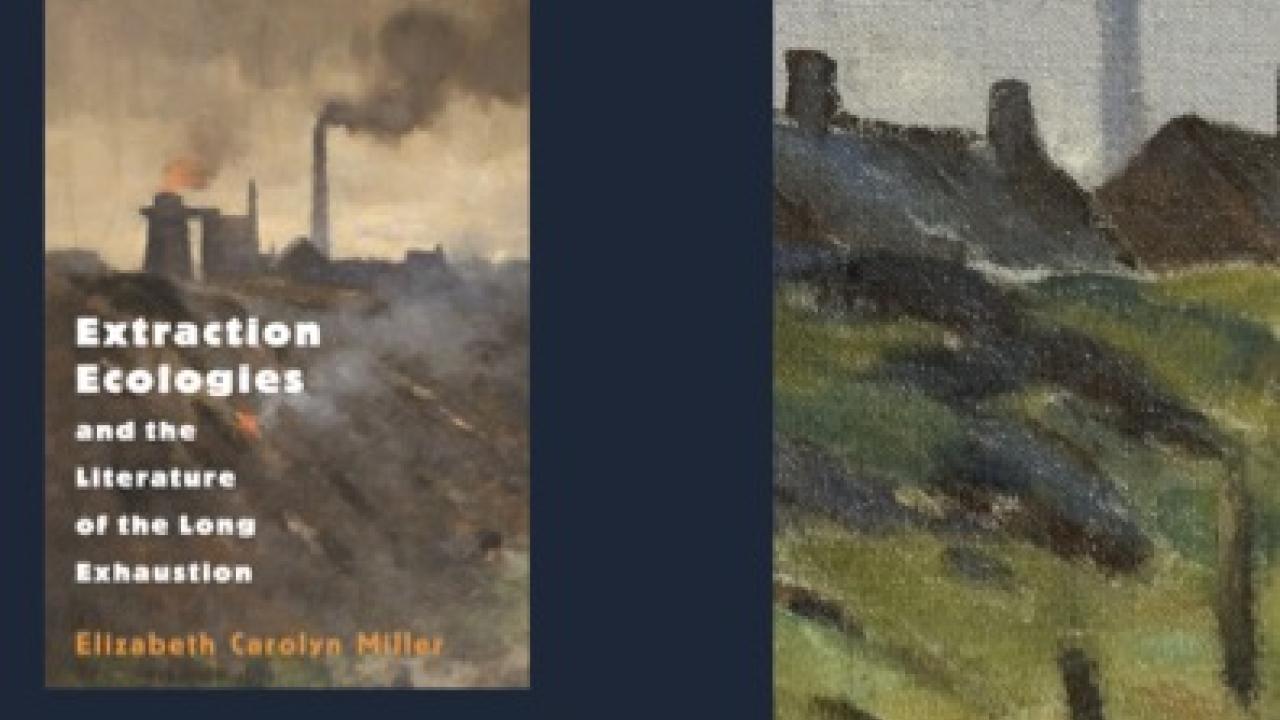
DHI Research Cluster Presents Discussion on Extraction and Literature
The DHI Research Cluster, “Extractive Pasts and Hollowed Futures,” held its inaugural event as a launch for UC Davis Professor of English Elizabeth C. Miller’s new book, Extraction Ecologies and the Literature of the Long Exhaustion, followed by an open discussion in the Voorhies courtyard. The event kicked off a year of discussions planned around concepts like extraction, mining, overproducing, and climate calamities.
The book, published by Princeton University Press in 2021, focuses on the relationship between resource extraction and the literature of the 19th and 20th centuries. “Extraction” refers to the idea of the removal of a finite resource whereas “extractivism” refers to the cultural and social practices of a society that is based on the removal of resources. Miller looks to literature as evidence of extractivism and suggests that literature changed to reflect, criticize, promote, or cope with extraction. In the 19th and 20th centuries, as global extractivism rose, Miller sees both a formal and informal confluence between works like George Eliot’s The Mill on the Floss and speculative fiction like J.R.R. Tolkien’s The Hobbit with Britain’s imperial projects.
The first part of the book focuses on the link between the provincial realist novel, time, and exhaustion. The second part of the book looks at the adventure narrative, extraction, and the resource frontier, while the final section thinks about worldbuilding in speculative fiction and terraforming (changing the terrain in order to extract). Literary genres like the provincial realist novel, which was primarily dependent on a marriage plot, and depicting a sense of continuity for future generations, began to be disrupted in regions with a lot of mining. By examining different literary genres and their connections to extraction, Miller’s book forefronts the ways that literature was recognizing the anxieties that come with a society that is dependent on exhausting its natural resources.
The open discussion was lively and touched on topics such as the link between extractivism and capitalism, race and mining, and whether or not authors imagined sustainable societies as a counter to the extractive one they lived in. In a response to a question about British attitudes towards the people who had already been mining in imperialized countries, Miller notes that, in the nineteenth century, Britain was actively promoting extractive activities in Latin America and forming a narrative that their technological advancements made mining much more efficient. For example, Miller points out that in King Solomon’s Mine by H.Rider Haggard, the British come across ancient mining equipment and see it as a sign that they were meant to extract—the ancient mining equipment was left there for the British to improve upon. Another question from a graduate student about how the extractive process relies on infrastructures made invisible provoked a thoughtful meditation on the steam engine. Originally, the steam engine and its tracks in England were developed to connect mines to ports, but its use as an extractive infrastructure became obscured by its reputation for fast leisure travel.
Miller credits her reading groups and research clusters as helping to foster her ideas for this book and positioned it as just the beginning of an ongoing conversation. This event marks the beginning of a year of programming from the Extractive Pasts and Hollowed Futures cluster, an interdisciplinary social sciences and humanities laboratory for examining the historical impacts of mining and other extractive activities. In the context of climate breakdown, the group brings together scholars and civil society voices to reflect on ongoing environmental justice issues arising from past and present-day extractivisms. Sited in the historical landscape of the mid-nineteenth century gold rush and in close vicinity to new lithium-mining frontiers, the group interrogates the toxic legacies of mining while sounding the complex social and global circumstances that allow for mining enterprises to take hold and continue to grow. To learn more about this research cluster, please contact faculty coordinator Prof. Jose Juan Perez Melendez (History). To purchase Professor Miller’s book, please click here.
